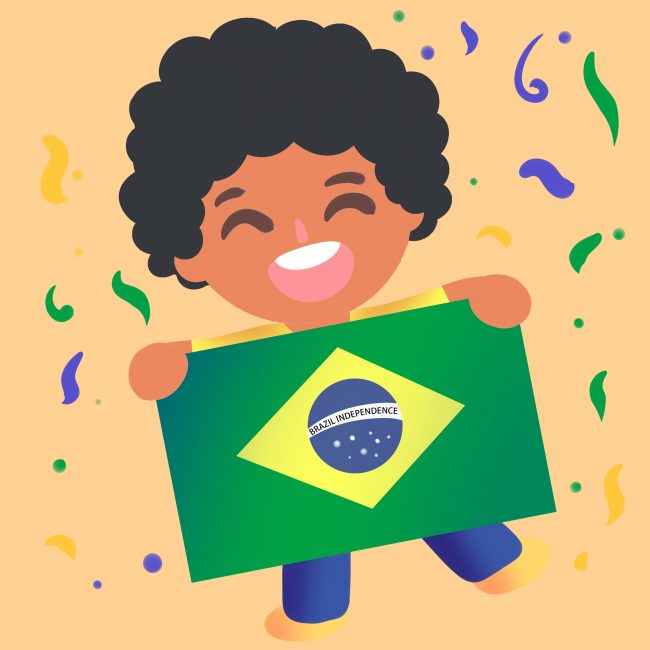
In 1493, genoa sailor Christopher Columbus returned to Spain with news of undiscovered Islands which later recognized to be the new world. Five years later Portuguese sailor Vasco da Gama successfully rounded the Cape of Good Hope and found a southern route to India.Then the Age of Exploration had begun, the two rival kingdoms met together and drew two lines on the globe dividing the world into two spheres. Spanish conquered the new world and the Portuguese established a trade empire in the Indian and South Atlantic oceans. However, neither side was aware of the small piece of the American continent which lay in Portugal’s half of the globe. Before European discovery, South America was inhabited by numerous Native Americans who had migrated from the north either by land or by shallow coastal sailing. Whether these early migrants lived in harsh conditions in the most diverse ecosystem is yet a mystery. But one thing is for sure, they subsisted mostly on agriculture but there were some hunter-gatherer communities as well.
A brave voyager, Pedro Alvares Cabral, was wildly southward voyaging. he sighted land on the 22nd of April 1500 and a few days later landed at the port of Segura. They name the locals they met as Indians just like the inhabitants of the West Indies. but Brazil’s population was just short of Portugal’s at just under 3 million. Early Brazil was divided into 15 colonies and granted to wealthy Portuguese elites. Only a successful one, however, was south incensed Island which made a moderate profit by native slaves. So the failing colonies were returned to the Portuguese crown in 1549 and a governor was appointed. Merchants and missionaries settled, they built a capital city Salvador and began trading in the Bay of All Saints. To help promote the economy, a group called Bundy ranch was sent to explore the land for minerals and slaves which increased settlement for the export economy. Slaves became more valuable than natives who died from European diseases in large numbers. More than 40% of all African slaves were imported to Brazil. Brazil grew rapidly during the 1600s creating new export markets for native plants as well as new plantation commodities like tobacco. The system was held by the royal fifth, 20% of all minerals crops and other products went directly to the Portuguese crown. It accelerates the establishment of public offices like tax collectors, accountants, and governors.
When gold was discovered in the 1700s the slavery economy boomed. an exploration of the interior was accelerated to look for new minerals. They opened up new markets to trade with the Spanish Empire. But when this area became overrun with pirates and smugglers, the Spanish and the Portuguese met to establish a shared border control in 1750. Brazilian culture was becoming increasingly more diverse. Europeans, Indians, and slaves formed a mixed-race group which was called Pardo. With countless numbers of Creoles and ethnic identities, Brazil was to become much more important to the Portuguese crown in the 1800s. When the Iberian Peninsula was invaded and occupied, the royal family moved to Rio where they set up the government during the war. After returning to Lisbon the king’s son Prince Regent declared Brazil independent and crowned himself Emperor. A brief independence war ensued where the Portuguese found themselves battling not only the Brazilian army but also thousands of civilian militia. The empire of Brazil, however, failed to enact the changes, the wealthy landowners and the liberal elites had overthrown the Portuguese for in the first place. So the nation was plagued by socialist insurgencies and slave rebellions.
Investment in Brazil showed no signs of slowing down, coffee which grew extremely well in the Brazilian climate. Eventually, the rate of immigration to Brazil was so high that it obviated the need for slaves and practice was ended in 1888. The Empire came inspired by the ideals of republicanism and the Enlightenment. soon after a military coup placed, Deodoro da Fonseca became the country’s first president and a country the United States of Brazil was born.
Anyway, Brazil is not a simple nation. It is full of social struggles, an amazing triumph of nationalism, a complex political structure. Plus it is at the top of the ladder of the world’s most popular game football.
Thousands of impassioned Brazilians gather each year to celebrate the Brazilian Independence, People congregate at the roadsides celebrating with banners, balloons, and streamers. A carnival is held all day long. People of all ages take part and have a good time. Most locals will use the day off to soak in the sunshine. Picnics and beach outings are some of the most popular pastimes. Fantastic musical events, parades, and fireworks will be held in all of the major cities. Every year, a large and impressive military parade takes over the Ministries Esplanade. There are some exciting activities, such as air shows, flags flying, musical performances, even an appearance by the president. Besides, Brazilians are known for throwing good parties.
Whether you’re at an official Independence Day event or simply spending some time with locals at the beach, Foreigners will feel utterly strong enthusiasm from Brazilians.
Leave a Reply